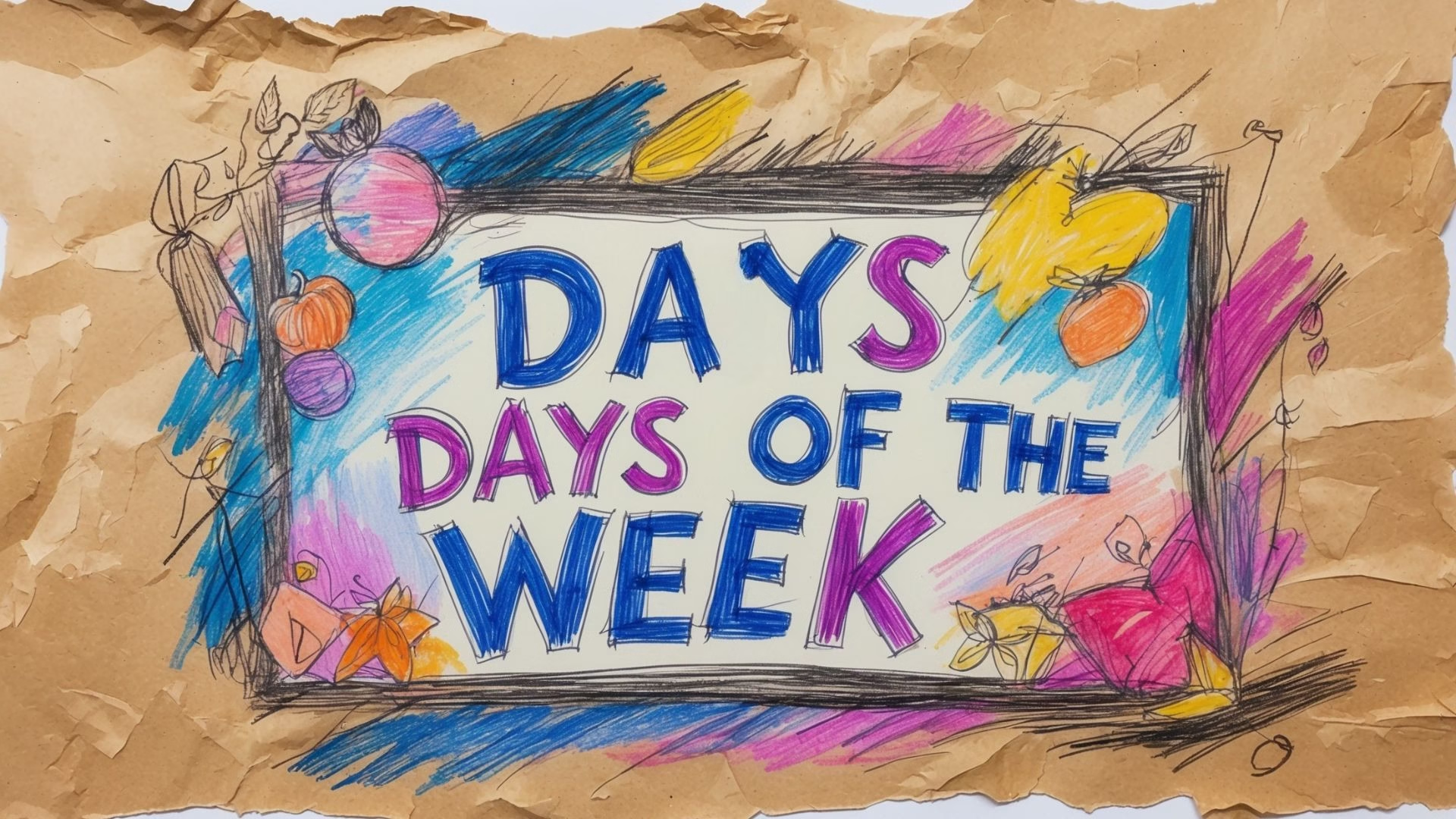Let’s Learn English: The Days of the Week!
Hello! Welcome back to learning English! Today, we are going to learn something very useful: the days of the week. Knowing the days helps us talk about our plans, our work schedule, our free time, and when things happen. We will learn the names of the days, how to say them, how to spell them, and how to use them in simple sentences. It might seem like a lot, but we’ll take it step-by-step. You can definitely do this! Let’s get started!
The Seven Days of the Week
There are seven days in a week. Let’s learn their names in order. Listen carefully and try to say them with me.
- Monday (Mun-day
- This is often the first day of the working week for many people.
- Spelling: M-O-N-D-A-Y
- Example: “I go to work on Monday.”
- Practice: Say it slowly: Mon-day. Good!
- Tuesday (Tooz-day or Tyooz-day
- The second day of the week.
- Spelling: T-U-E-S-D-A-Y
- Example: “My English class is on Tuesday.”
- Practice: Let’s say it: Tues-day. Great!
- Wednesday (Wenz-day
- The middle of the working week. This spelling looks tricky, but we don’t say the ‘d’ or the second ‘e’. Just “Wenz-day”.
- Spelling: W-E-D-N-E-S-D-A-Y
- Example: “We have a meeting on Wednesday.”
- Practice: Try saying it: Wednes-day. Remember: sounds like “Wenz-day”. You got it!
- Thursday (Thurz-day
- The day after Wednesday. Make the ‘Th’ sound at the beginning (like ‘think’).
- Spelling: T-H-U-R-S-D-A-Y
- Example: “Thursday is before Friday.”
- Practice: Focus on the ‘Th’ sound: Thurs-day. Excellent!
- Friday (Fry-day
- The last day of the working week for many. Hooray!
- Spelling: F-R-I-D-A-Y
- Example: “I meet my friends on Friday night.”
- Practice: Say it with a smile: Fri-day. Wonderful!
- Saturday (Sat-ur-day
- The first day of the weekend! A day for relaxing or fun activities.
- Spelling: S-A-T-U-R-D-A-Y
- Example: “I go shopping on Saturday.”
- Practice: Let’s say it: Sat-ur-day. Very good!
- Sunday (Sun-day
- The second day of the weekend. Often a day for family or rest.
- Spelling: S-U-N-D-A-Y
- Example: “Sunday is a day of rest.”
- Practice: Nice and easy: Sun-day. Perfect!
Let’s say them all together: Monday, Tuesday, Wednesday, Thursday, Friday, Saturday, Sunday.
Try again: Monday, Tuesday, Wednesday, Thursday, Friday, Saturday, Sunday.
You did it! Saying them often helps you remember.
Important: In English, we always write the days of the week with a capital letter at the beginning (M for Monday, T for Tuesday, etc.).
Talking About Time: Today, Yesterday, Tomorrow
Knowing the days is great. Now let’s learn words to talk about when a day is.
- Today: The day that is happening right now.
- Example: “Today is Sunday.” (Remember to change this to the actual day!
- Practice: What day is it right now? Try saying: “Today is…” (Say the name of the day). Fantastic!
- Yesterday: The day before today.
- Example: “If today is Sunday, yesterday was Saturday.”
- Practice: Think about the day before today. What was it? Say: “Yesterday was…” (Say the name of the day). You’re getting it!
- Tomorrow: The day after today.
- Example: “If today is Sunday, tomorrow is Monday.”
- Practice: What day is after today? Say: “Tomorrow is…” (Say the name of the day). Brilliant!
Using Days of the Week in Sentences
We use the days of the week to talk about schedules, plans, and routines. We often use the word “on” before the day.
- “I have English class on Tuesday.”
- “He plays football on Saturday.”
- “They visit family on Sunday.”
- “I don’t work on weekends.” (Weekend = Saturday and Sunday
We can also ask questions:
- “What day is it today?” (Answer: “Today is…”
- “When is your class?” (Answer: “It’s on Monday.”
- “Do you work on Friday?” (Answer: “Yes, I do.” or “No, I don’t.”
Let’s Practice!
Time to use what you learned!
- Can you say the seven days of the week in order? Try now!
- (Monday, Tuesday, Wednesday, Thursday, Friday, Saturday, Sunday). Keep practicing until it feels easy!
- Let’s imagine today is Wednesday.
- What was yesterday? (Think: The day before Wednesday is Tuesday). Say: “Yesterday was Tuesday.“
- What is tomorrow? (Think: The day after Wednesday is Thursday). Say: “Tomorrow is Thursday.” Good job!
- Think about your week. What do you do on Saturday?
- Try making a sentence: “I ______ on Saturday.” (Maybe “I relax on Saturday” or “I clean my house on Saturday” or “I see friends on Saturday”). Wonderful!
- How do you ask someone what day it is?
- (Think: “What day is it today?”). Perfect!
Knowing the days of the week is very important for daily life. You can use them to make appointments (“Can I see the doctor on Tuesday?”), understand schedules (“The shop is closed on Sunday”), and talk about your life (“I love Saturdays!”).
Keep practicing saying the days, spelling them, and using them in sentences. You can write down your schedule for the week using the English days. You are learning so much and doing so well! Keep up the excellent work!











0 Comments